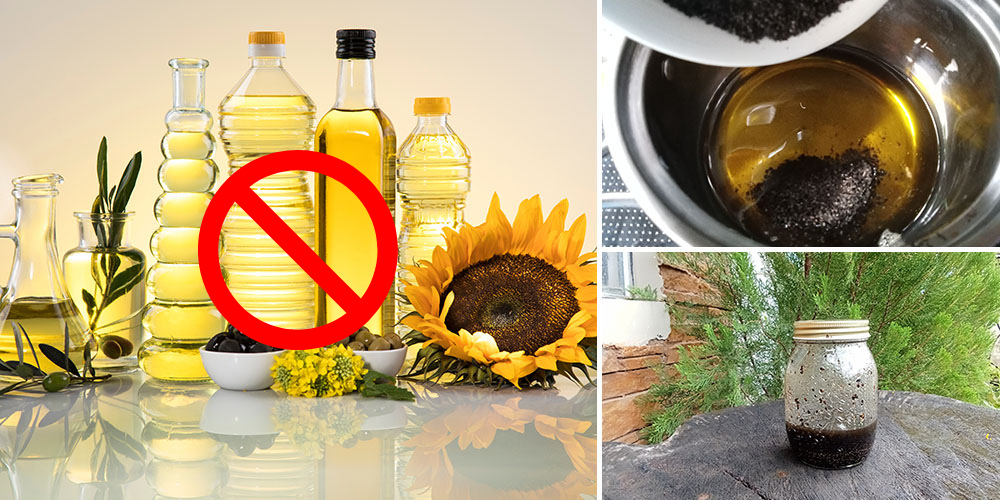
The Truth About Seed Oils
The recent seed oil conundrum may have impacted how concerned individuals look at seed oils. People have divided opinions on it, and health experts have their say.
Accordingly, seed oils are unhealthy, typically because of how they are processed. There are unsupported claims that seed oils are toxic and may trigger inflammation because of their high omega-6 fatty acids content.
Dieticians and nutritionists claim that the demonization of seed oils is because of new diet trends, conspiracy theories, and misinformation from internet influencers and celebrity doctors.
What Are Seed Oils?
Oils have long been a part of the human diet used in baking and cooking. They are also found in almost all processed foods and we consume them every day in varying amounts.
Vegetable oil is the blanket term for all plant oils extracted from different parts: fruits, grains, nuts and seeds.
Seed oils refer to refined vegetable oils derived particularly from seeds or nuts of various plants and crops. Some examples are:

- Corn
- Canola
- Soy
- Sunflower
- Safflower
- Grapeseed
- Peanut
The Truth About Seed Oils
Seed oils became widespread in the 1950s when research revealed the connection between saturated fats and heart disease. Since then, people began replacing butter and lards with seed oils until more recent claims were surmised to question the previous research.
Seed oils are not inherently bad, given the many health benefits they can provide. They only become bad when they are industrially over-processed and over-consumed.
They Contain Good Fats
Dietary fats come in different types: saturated, unsaturated and trans fats. Saturated fats are derived from animal products, while unsaturated fats are found in fish and plants. Trans fats are the product of food processing.
Unsaturated fats can be monounsaturated or polyunsaturated, which is determined by their omega-3, omega-6 and omega-9 fatty acids. These good fats are abundant in seed oils and are beneficial in boosting the brain and heart health.
Abusing the wrong fats will unfortunately not only make your life hard to bear, but they will shorten it drastically. Check out this testimony that was a game-changer for me, and will be for you as well.
They Have Omega-6 Fatty Acids
Seed oils contain omega-6 fatty acids and it is what caused the main issue about seed oil. Omega-6 fatty acids, particularly linoleic acids, are polyunsaturated fats. The body needs them but cannot make them, so we can only get them from food. Its role in the body is to promote healthy skin and maintain the cell membrane.
Omega-6 is receiving a bad rap because it is said to trigger inflammation. However, it also has beneficial homeostatic functions. When omega-6 fatty acids are broken down, they produce a by-product called eicosanoid. Eicosanoids play an important role in vascular leakage regulation and barrier formation, protection of stomach mucosal integrity and platelet aggregation.
May Lower the Risk of Cardiovascular Diseases
Linoleic acid and eicosanoid may be known as pro-inflammatory. However, it is produced in negligible amounts in the cells and altered by the physiological condition of the specific tissues. This may mean that eicosanoid is not the sole culprit in the inflammation and development of chronic diseases.
Some studies revealed that linoleic acid may even help in reducing cholesterol and lowering the risk of heart diseases. Replacing saturated fatty acids in the diet with omega-6 polyunsaturated fatty acids can lower the LDL based on a randomized trial published in the American Heart Association journal.
I can’t always keep the best diet, and my heart suffers from it. It’s a shame because it’s the thing that keeps me alive… literally. I started using natural remedies to manage my blood sugar, blood pressure, and heart health and I must say I’m impressed with how great I feel. No more palpitations from lab-made heart pills. Take a look HERE to see the ingredients.
They Have Nutritional Benefits
Seed and vegetable oils are good sources of Vitamin E, another essential vitamin that the body cannot produce by itself. Vitamin E is useful in promoting skin and eye health and in strengthening the body’s immune resistance.
Some seed oils also have Vitamin K, which helps in blood clotting and faster wound healing. Moderate and safe consumption of seed oil may impact overall health by assisting in nutrient absorption and body temperature regulation.
The oil you are using in salads or when you fry something has a great impact on your digestive system. You can irritate your gut or damage the flora, which results in discomfort or even lead to more serious health issues over time like inflammation, irritable bowel syndrome (IBS), leaky gut syndrome.
I shield my gut with a regenerative plant-based tincture. You can make it yourself, or get it from a certified herbalist who is making handmade tinctures, 100% organic and non-GMO. Check this Gut Healing Tincture HERE!
There Is No Reason To Avoid Fats, but Choose Wisely
If you want to cut back on seed oils, consider focusing on alternatives like tallow, ghee, and grass-fed butter. These fats can offer a range of health benefits and are less processed than many of the seed oils commonly found in supermarkets. Organic options like olive, coconut, and avocado oils are also great choices due to their natural anti-inflammatory properties.
Nutrition needs to be balanced. Like many healthy foods, the secret to keeping balance is consuming the right fats in moderation. There is no need to avoid fats completely—just use those that support your health. Healthy fat sources are necessary for giving the body energy, supporting satiety hormones, regulating body temperature, and aiding in nutrient absorption.
Anyway, there is one oil that you should totally remove from your diet today! Each day of consuming it shortens your lifespan. Click here to see what I’m talking about.
Healthy Ways of Consuming Seed Oils
Carbs, sugar, sodium, and seed oils are widely available in processed foods. However, they are not mainly to be blamed for weight gain, inflammation and chronic diseases. Health problems arise from different causes like genetics, environment and overall lifestyle and habits.
We recommend lessening seed oil consumption but not totally restricting it. Remember, your body needs seed oils as a part of healthy and balanced eating.
Here’s how to use it wisely:
- Try cooking at home whenever possible to avoid restaurants and fast foods where fat use is questionable
- Avoid ultra-processed foods
- Buy pure and unrefined versions of seed oil
- Mix in alternative oils like extra virgin olive oil (EVOO) or avocado oil
I learned all this information from a herbalist’s book. Her expertise is unmatched, and the fact that I’m thriving is a testament to the effectiveness of her guidance. It’s a guide that provides detailed guidance on managing even the most severe health condition throughout each part of the day. I’ll leave a link for you HERE to check out her story.
DIY Homemade Seed Oil
Cutting on seed oil use is a personal choice. But, you cannot totally remove fat from the diet if you want to promote clean and healthy eating.
The World Health Organization provides guidelines on total fat intake, which should be at 30% or less of total energy intake for adults. Trans and saturated fats must be replaced with monounsaturated and polyunsaturated fatty acids.
If you want to be sure about your seed oil source, here is an easy recipe you can make at home by infusing black cumin seeds (Nigella sativa).
Black seed oil can be used for cooking, but less commonly because of its low smoke property. However, it is popular as a dietary supplement and topical product. Black seed oil is used for the following health advantages:
- Immune support
- Reducing inflammation
- Improving and treating digestive problems
- Antioxidant
- Boosting scalp and skin health
Homemade Black Seed Oil
 What You Will Need
What You Will Need
- Mortar and pestle or grinder
- Glass jar with cap
- ¼ cup black cumin
- ½ cup coconut or olive oil
Steps
- Dry roast the seeds in low heat for 2 to 3 minutes.

- Allow the seeds to cool and grind into powder using a mortar and pestle or grinder.

- Warm the coconut or olive oil in low heat and add the ground black cumin seeds. Do not overdo it, just heat it a little without letting it smoke.

- Pour the oil and seeds into a glass jar.

- Place the jar under the sun every day, bringing it inside during the evening. The black seed oil is ready for use after 5 to 6 days. You may strain the oil or use it as it is.

To use: Take one teaspoon of black seed oil in the morning on an empty stomach for stomach problems, eye diseases, swelling, inflammation and headache.
To cure scanty menses, mix 2 tsp black seed oil with 2 tsp honey and take it with a glass of milk twice a day.
You may also use the oil topically for skin diseases, toothache and scalp and hair problems.
The distinct nutty scent of olive oil and earthy aroma of black cumin make it a fancy dressing for salad and other culinary products.
Although black seed has many different health benefits, please use it sparingly. Consult your doctor if you have any underlying health conditions before taking any seed oil as a food supplement.

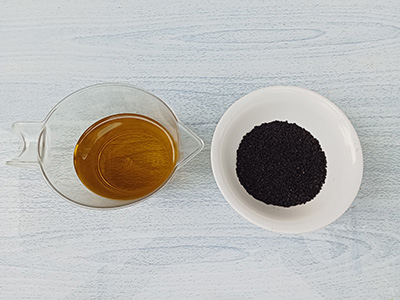 What You Will Need
What You Will Need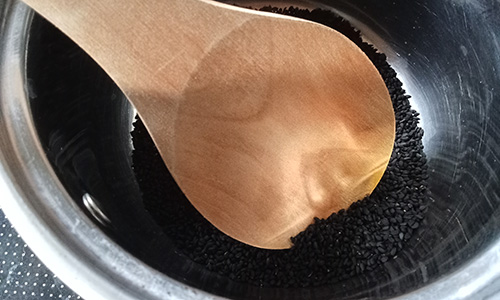
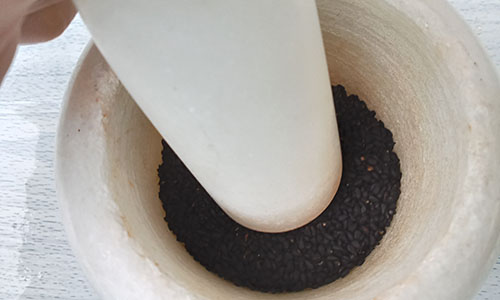
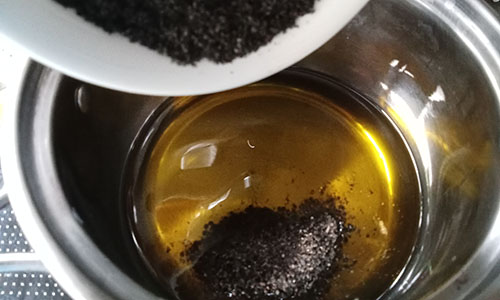
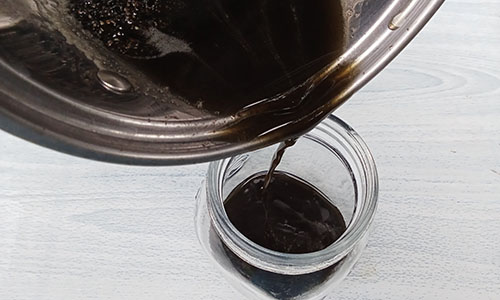
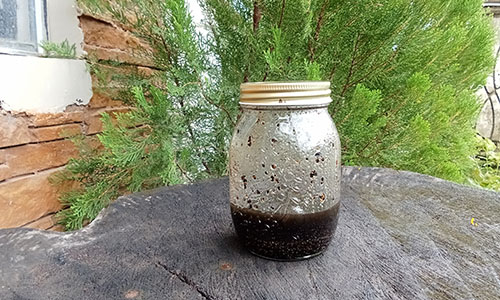
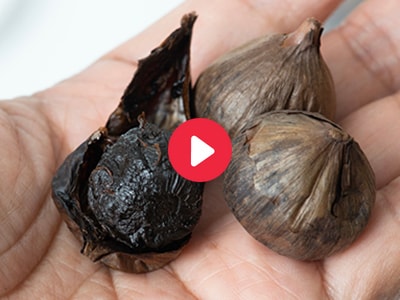
How much is too much black seed oil? I’ve been taking 1tsp a day for probably 8-9 months. I read somewhere that it is a natural form of ivermectin. Am I taking too much?
Hey Debbie, Great question!
Black seed oil has been used traditionally in moderate amounts for various health benefits. A common dose is around 1 teaspoon per day, so you’re within a typical range.
However, long-term use should ideally be monitored, and it’s always a good idea to consult with a healthcare provider to ensure it’s suitable for your specific health needs.
Regarding the ivermectin comparison, black seed oil contains thymoquinone, which has some anti-inflammatory and antioxidant properties, but it’s not the same as ivermectin.
They work differently in the body, and black seed oil should not be seen as a substitute for ivermectin or any other medications.
Many Blessings and Good Health!
I too am interested in “how much/days in a row” is too much? 🙂 thanks
Hey Lydia!
For black seed oil, a teaspoon daily is generally considered safe for most people. If you’re using it consistently for a prolonged period, it’s wise to take breaks or consult a healthcare professional to ensure it’s still benefiting your health without any potential downsides. Since everyone’s body responds differently, keeping an eye on how you feel and adjusting as needed is important.
Good health!
I would argue that if one can find organic Corn, Canola, Soy, Sunflower, and Safflower the oil might be the way to go. However, so many of these seeds come from genetically modified plants these days, so this then begs the question, “How many of these oils contain unacceptable levels of insecticides, pesticides, and herbicides?”.
Also consider the process in which these corporate seed oils are produced. High temperature extraction turns the oils rancid. Once an oil has become oxidized, it changes the way it interacts with our bodies! How old are the oils before they even reach the end user? I would 100% recommend the animal fats….forlorn in our time. I would also recommend only one oil producer in the market I’ve found that is trust worthy and has AWESOME products. Look up andreas seed oils! You’ll be glad you did. Blessings to all!
You don’t address the fact that the seed oil consumption ratio is in excess of the recommended 1:1 (omega 6 to omega 3 fatty acid ratio). When these seed oils are in everything we eat, the ratio becomes ~ 40:1 which is very unhealthy and the Linoleic acid consumption becomes toxic.
Thank you for your comment, Michael!
You’re absolutely right that balancing omega-6 and omega-3 fatty acids is crucial for health. Many modern diets have an imbalance favoring omega-6, largely due to the widespread use of seed oils in processed foods. This can indeed contribute to inflammation and other health issues.
To achieve a healthier ratio, it’s advisable to reduce the intake of omega-6-rich seed oils and increase omega-3 sources, like flaxseed, chia seeds, and fatty fish. Being mindful of overall dietary sources of fats and striving for balance is key.
Good Health!
Thank you so much for added info. We often forget all the added oils in our daily foods.
I feel you have glossed over the point of why people are questionning seed oils and that you have suggested that the issue is only an issue because of “conspiracy theorists” etc etc. with the unspoken implication suggestion that these groups are uninformed and misleading. There may be an issue with the omegas – I haven followed that line of argument – but a major issue is the processing. Please read Dr Catherine Shanahan. Her work is easy to read and quite compelling. Im not saying I agree with everything she says but it lays out the rational for seed oils being damaging to our health IF they have been processed. The seed oils we cook with are vastly different from the oils we eat when we eat a raw unprocessed cob of corn or sunflower seed, and they are damaging to our health BECAUSE of the processing. There are no pure unrefined versions of these – at least not in quantities that are commercially viable and accessible to most of us. We are mislead because we see labels like pure and organic on the bottles. Pure doesnt have a meaning in this context and an oil can still be organically grown but go through the damaging refining processes which are the problem. Like so much or our food, seed oils are a result of political and industrial wars – not concern for our health.